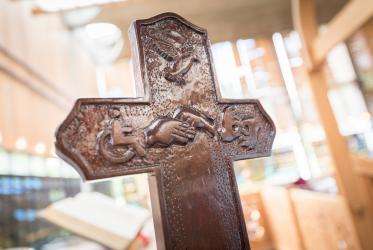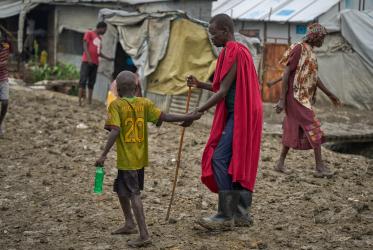"As custodians of an ancient spiritual heritage, Ethiopian Christianity has a unique contribution which is of central importance in Africa and to the ecumenical family world-wide," stated the general secretary of the World Council of Churches (WCC), Rev. Dr Samuel Kobia, during his first official visit to the Ethiopian Orthodox Tewahedo Church, 24-30 September 2005.
Meeting at the start of the visit with H.H. Patriarch Abune Paulos, leader of the 38-million-member Ethiopian Orthodox Church, Kobia contrasted the "moral wealth" of the African continent with the "fear and poverty" which marks the lives of so many in Africa, whose people struggle with "HIV/AIDS, insecurity, corruption and conflict".
"Ethiopia has a vocation to nurture a renewed commitment for peace and reconciliation in the troubled lands of the African continent," Kobia added. "Jesus Christ came into the world to give abundant life. This signifies the intrinsic connection between our quest for visible unity of the church and engagement in a life-centred ministry. Churches must unite their voices and their actions if lasting peace and justice is to be attained".
Patriarch Abune Paulos welcomed the WCC visit to Ethiopia, and confirmed his intention to attend the 9th Assembly, planned for Porto Alegre, Brazil in February 2006, where a significant Ethiopian Orthodox delegation is expected to participate.
Accompanying the WCC delegation, Dr Agnes Abuom, WCC president from Africa, underlined that the visit to Ethiopia was an opportunity to "draw wisdom and strength" from the history and struggles of the church in the country, and to accompany the people of Ethiopia at a "critical time".
<span style="font-weight: bold; "» Averting violent confrontation
The visit came at a time of heightened political tension in the country as government and opposition disputed the outcome of parliamentary elections earlier in the year.
Meeting with Ethiopian prime minister Meles Zenawi, Kobia expressed his confidence that political leaders on all sides will make every effort to safeguard the constitution and the peace and security of the people.
"We sincerely appeal to the Ethiopian government to reach out to the opposition parties and civil society groups in Ethiopia and embrace the path of dialogue as the means to resolving the pending matters following the recent elections," the WCC general secretary stated.
Kobia offered the support of the WCC to church efforts at negotiating a peaceful resolution to the political tensions between government and opposition.
"The WCC is willing to offer every assistance and support to the government and the opposition to avert confrontation and instead put the interests of the people of this great nation first," Kobia stated.
The general secretary called on religious communities in Ethiopia to mobilize efforts to foster dialogue. "Religious institutions and political leaders have a common responsibility to employ all options to alleviate tensions and avoid conflict in a country which is emerging from a period of such calamities," he emphasized.
The WCC has been active in mediation efforts between conflicting parties in other African states, and has a long-standing history of initiative in conflict prevention and resolution.
<span style="font-weight: bold; "» Church social action
The WCC delegation was earlier received by Rev. Iteffa Gobena and the leadership of the Ethiopian Evangelical Church - Mekane Yesus, which is also a member church of the WCC in the country.
During the week-long visit, the delegation presented the mission and priorities of the WCC to a gathering of Ethiopian Orthodox hierarchs, and visited several social, educational and sustainable agriculture programmes carried out by the church.
New initiatives in the field of HIV/AIDS prevention and anti-stigma education pioneered by the Ethiopian Orthodox Church were presented to the WCC group. The WCC continues to coordinate a number of international ecumenical social and humanitarian programmes in Ethiopia, one of the world’s poorest countries, which is emerging from decades of political turmoil, famine and war.
Included in the programme were meetings with other government officials and talks with the leadership of the African Union, based in Addis Ababa.
Additional information about the WCC visit to Ethiopia is available in our September 21st press release:






